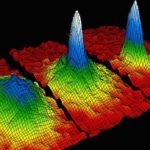Are the Quantum World and The Real World the Same Thing?
While quantum mechanics is arguably our most successful theory of nature, it is perhaps best known for its strangeness. Quantum theory—and its key mathematical tool, the wave function—excels at predicting probabilities for the outcomes of experiments. Yet, after nearly a century of debate, physicists and philosophers of science can agree only that there is no real consensus on what quantum theory actually says about the world. This has led to a cottage industry of interpretations of quantum theory, which now number in the hundreds if not the thousands.
At the center of this quagmire is the “wave function.” Using the wave function, better known by its mathematical nickname, ψ (“psi”), physicists can calculate the probability that a quantum measurement will have a particular outcome. The success of this procedure has allowed us to control the subatomic world with unprecedented precision: You can thank (or curse) quantum theory for your iPads, smartphones, and laptops. Yet, unlike classical physics, quantum mechanics can’t deliver a single, definite answer to a simple question about the outcome of a measurements. Instead, it returns a probability distribution representing many different possible outcomes. It’s only after you make a measurement that you observe a stable, predictable, classical outcome. At this point, the wave function is said to have “collapsed.”
